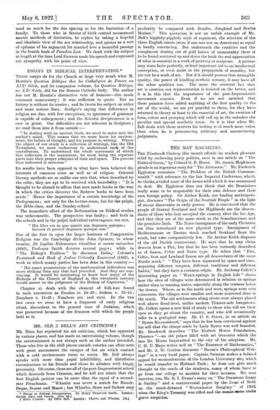Houtin's Question Biblique chez les Catholiques de France au XIXe
Siecle, and its companion volume, La Question Biblique an XXe Sieele, did for the Roman Catholic body. The author has not M. Houtin's distinctive vein of humour—this made
comment unnecessary ; it was sufficient to quote. But no history is without its ironies ; and he treats his subject on wider and more serious lines. Scaliger's saying that differences in religion are due, with few exceptions, to ignorance of grammar
is capable of enlargement ; and the Scientia Scripturarum is a case in point. Our difficulties are not inherent in Scripture ; we read them into it from outside :- " In dealing with an ancient book, we need to enter into the author's mind. This means that we must know his environ- ment, his habits of thought, and his purpose in writing. Where the object of our study is a collection of writings, like the Old Testament, we must endeavour to understand each of the contributors. To understand the whole movement of which this collection is the monument, we must bring the separate parts into their proper relations of time and space. The process thus indicated is criticism."
Its results have been opposed in what have been believed the interests of common sense as well as of religion. Oriental literary methods are so unlike our own that, when described by the critic, they are apt to be received with incredulity.: " It is thought to be absurd to affirm that men made books in the way in which the critics discover the Hebrew books to have been made." Hence the importance of a certain knowledge of the Prolegomena ; not only for the lecture-room, but for the pulpit, the Bible-class, and the Sunday-school.
The immediate effect of the Reformation on Biblical studies. was unfavourable. The perspective was faulty ; and both in the schools and in the pulpit individual extravagance ran riot.
" Hie liber est in quo qunrit sus dogmata quisque ; Invenit et pariter dogmata quisque sus."
One of the first to open the larger horizons of Comparative Religion was the Cambridge divine John Spencer, to whose treatise, De Legibus Hebraeorunt ritualibus et earum rationibus (1685), Professor Smith devotes several pages ; while in " The Bishop's Problem " he discusses Bishop: Colenso's Pentateuch and Book of Joshua Critically Examined (1862), a
work to which scanty justice has been done in this country :-
" His exact presentation of the mathematical difficulties was more striking than any that had preceded. And they are con- vincing. It would be interesting to know how many of the Bishops of the Church of England in this twentieth century would assent to the judgment of the Bishop of Capetown."
Chapter xi. deals with the element of folk-lore found in such narratives as Exodus iv. 24-26 ; Joshua v. 13-15 ; Numbers v. 11-41 ; Numbers xix. and xxxi. In the two last cases we seem to have a fragment of early religious ritual, discordant to the general tone of Judaism, which was preserved because of the firmness with which the people held to it.


































 Previous page
Previous page